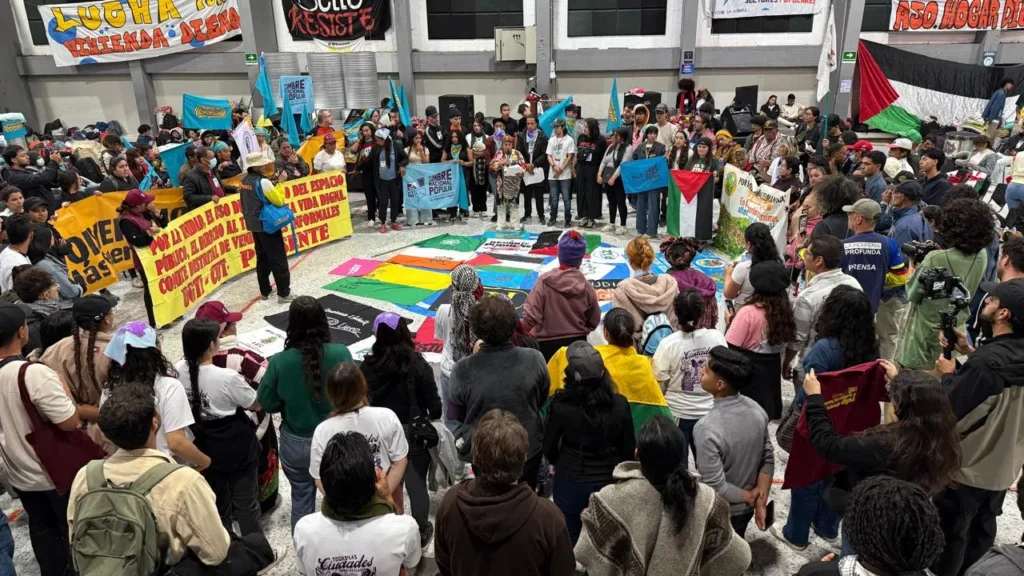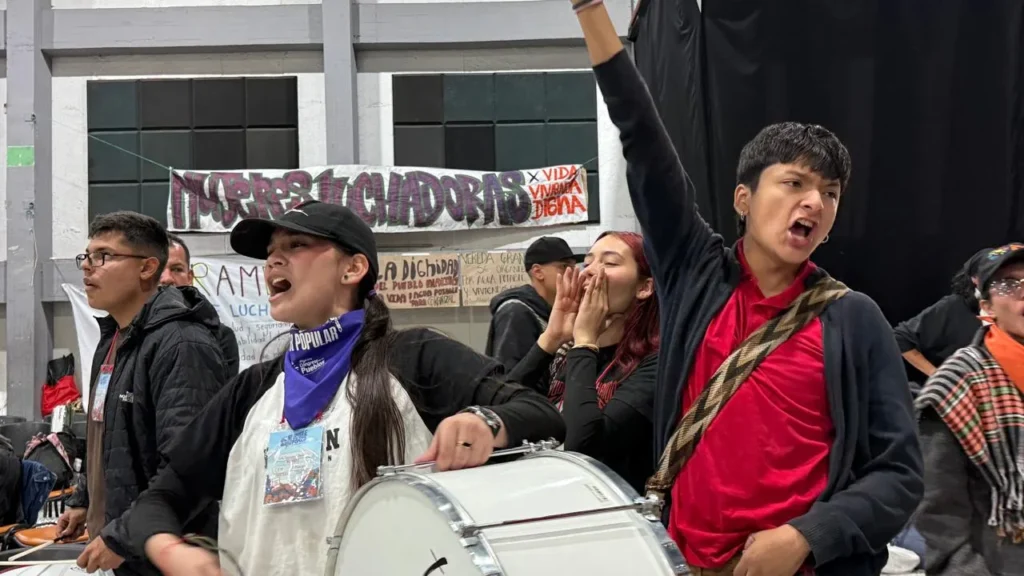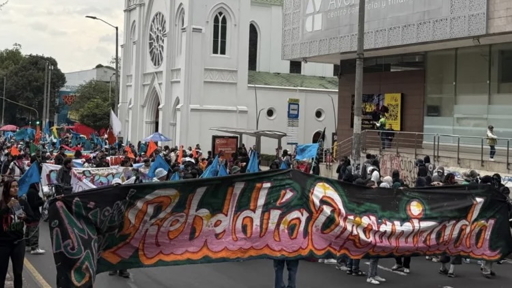On September 29, the National Popular Summit concluded three days of debates in Bogotá with the approval of a final declaration that outlines an agenda of mobilizations across the country starting in October. The meeting also decided to create a permanent space for convergence of the processes of Colombian urban organizations, consolidating a framework of unity for the coming years.
The document was drafted after meetings with delegations from 15 cities, including Cartagena, Barranquilla, Cali, Medellín, Cúcuta, and the capital Bogotá. The discussions were held at the National Pedagogical University, which welcomed around 1,500 participants, including workers from popular economies, union leaders, Black communities, youth, artists, housing collectives, urban popular guards, and women’s organizations.
One of the main points approved in the declaration was the defense of a Comprehensive and Popular Urban Reform, with access to land, basic public services, and the recovery of territories. For Juliana Ramírez, one of the spokespeople for the Summit, this is the heart of the agenda defined by the movements.
“The conclusion is that there must be comprehensive urban reform that guarantees land to live on, universal access to public services, and the broad recovery of urban territories. Without this, our cities will continue to reproduce exclusion and inequality,” she explains.
According to her, the neoliberal model of the city “drives the poor to the outskirts and privatizes what should be common.” Ramírez also pointed out that the urban struggle is not limited to housing: it involves transportation, health, education, and the right to remain in working-class neighborhoods.
 The summit brought together more than 1,500 participants for three days of debates at the National Pedagogical University (Photo: Rodrigo Chagas/Brasil de Fato)
The summit brought together more than 1,500 participants for three days of debates at the National Pedagogical University (Photo: Rodrigo Chagas/Brasil de Fato)
The dispute over public space was presented as a strategic focus of the Summit. For Julián Díaz, the way cities are planned today reinforces inequalities and makes the working classes vulnerable.
“Cities have been designed to segregate, and this is evident in all spheres, even in culture. That is why fighting for public space is common sense, and the arts and culture are fundamental tools in this struggle,” he says. He adds that the October demonstrations will be in the spirit of taking to the streets to reaffirm that “cities are for everyone.”
As a strategic decision, the organizations announced the creation of a permanent space for convergence of urban processes, with local, regional, and national bodies. The idea is to sustain the National Popular Summit (Cunap) as a framework for continuous coordination.
“Based on this convergence, we want to consolidate an alternative proposal for the city and join forces in a broader transformation process for all of Colombia,” highlights the final document.
Against paramilitarism and for public safety
The debates between the movements took place under the impact of an attack with homemade bombs on September 27, during the summit. At least seven explosions were recorded throughout the day, in areas close to the collective kitchens and university courts.
Although no one was injured, the episode was interpreted as an attempt at intimidation. The summit’s security team identified evidence of improvised chlorine bombs. Suspicion falls on paramilitary groups operating in educational institutions.
The summit organizers stated that the attacks were ideologically and politically motivated. In light of episodes of political violence such as these, one of the central points of the declaration was the fight against paramilitarism, which remains active in cities and rural areas across the country.
Laura Ochoa, also a spokesperson for the Summit, explains that political violence requires organized responses from society. “Paramilitarism continues to assassinate popular leaders across the country. That is why, in October, we will expand the struggle with a mobilization that is expected to bring together more than 5,000 people,” she said.
 One of the points approved in the declaration was the defense of a Comprehensive and Popular Urban Reform, with access to land, basic public services, and recovery of territories (Photo: Rodrigo Chagas/Brasil de Fato)
One of the points approved in the declaration was the defense of a Comprehensive and Popular Urban Reform, with access to land, basic public services, and recovery of territories (Photo: Rodrigo Chagas/Brasil de Fato)
She emphasizes that organizations want to discuss a new security model. “We no longer accept the national security doctrine that protects accumulators and criminalizes the poor and social activists. We are building community self-care mechanisms, such as the Popular Urban Guards, and we demand the establishment of a Popular Truth Commission so that there can be justice and reparation.”
Even with President Gustavo Petro’s policy of total peace, episodes of violence against social, Indigenous, peasant, and ex-combatant leaders remain high.
From 2016 to 2024, the Institute for Development and Peace Studies (Indepaz) recorded almost 2,000 murdered social leaders; in 2023 alone there were 188, in 2024 there were 173, and by August 2025 there were already over 100 cases.
Feminism, anti-racism, and youth
The Summit declared a national emergency in response to the rise in femicides in the country and reinforced the need for anti-patriarchal and anti-racist cities. The proposal is to strengthen community care networks, boost popular economies with a gender focus, and consolidate ethno-ecological protection zones.
In the area of education, the declaration calls for a new Education Law to serve the working class and the creation of a national educational welfare system. The organizations also decided to prepare a National Popular Summit of Youth and Students for the coming years.
The agenda set by the Summit includes participation in the feminist mobilizations on November 25 (25N) and March 8 (8M), as well as a national day of action against gentrification and the neoliberal transportation system.
Other next steps include preparing a national occupation of land and urban infrastructure, actively supporting the struggles of children and adolescents, and holding the National Art Festival “A la esquina y la vereda” (On the Corner and the Sidewalk), scheduled for December 2025 in Bogotá.
The final declaration concludes by stating that the National Popular Summit “will flow like a river that anticipates the rupture with everything that oppresses in the cities” and sends a message of international solidarity to the Palestinian people.
This article was translated from and article originally published in Portuguese on Brasil de Fato.
The post Colombia’s National Popular Summit charts urban reform agenda and mobilizations for October appeared first on Peoples Dispatch.
From Peoples Dispatch via this RSS feed


